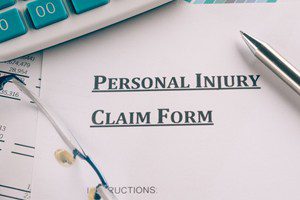
Personal injury claim form
Filing a personal injury claim against the at-fault party’s insurance company after any type of accident can be a time-consuming and stressful process. While you likely only want to focus on recovering from your injuries and moving on with your life, it can be difficult when the insurance company fails to make a fair settlement offer and offers excuses to limit or deny your injury claim. The following are common reasons you may be given, although it’s important to remember these are tactics designed to make you give up or stop pursuing your claim.
- Your injuries are due to a pre-existing condition. It’s common for insurance companies to claim injuries sustained in a car accident were actually related to a prior medical condition from a previous car accident or injury. While pre-existing injuries can negatively affect a personal injury claim, this does not mean you are not entitled to compensation. A pre-existing condition may have nothing to do with the injuries you have suffered or the accident may have worsened your existing condition.
- The police report does not mention complaints of pain. The insurance company will always look for signs that you are exaggerating your injuries or faking. A common tactic is showing that the police report has no indication you were injured or complained of pain at the scene of the accident. It is actually very common for car accident victims to feel fine after the accident due to the rush of endorphins and adrenaline that block pain. Sometimes the full extent of the injuries aren’t realized for days.You can strengthen your claim by seeking medical attention immediately after an accident if you feel any discomfort. However, you still have a claim if you were injured, even if you do not realize for a few days.
- You didn’t go to the hospital after the crash. Seeking immediate medical attention is very important after an accident, even if you do not feel pain. An accident can lead to a rush of adrenaline and shock that masks any pain you may be feeling. Seeking medical care right away helps prove that the accident caused your injuries while substantiating any injuries you may have suffered. While it’s important to see a doctor as soon as possible, you still have a claim even if you did not do so immediately.
- No one else was hurt in the accident. No matter how serious or minor an accident appears, there is no way to predict who will be hurt and how. It is entirely possible for only one person in a full vehicle to suffer injuries while passengers are unharmed. Many factors can affect injury, including safety features of the vehicle and the age and general health of the occupants. It does not matter if no one else was injured in the car accident.
- You didn’t have signs of injury at the scene. Just because you do not have obvious signs of injury like fractures, bruising, or cuts does not mean you didn’t suffer an injury. Many injuries offer no visible evidence and may not even show symptoms for days, including concussions, neck injuries, and traumatic brain injury. You have the right to be compensated for these injuries, regardless of objective external evidence.
- You over-treated your injuries. It is not the insurance company’s place to decide whether the level of medical treatment you received was appropriate or not. Only a medical professional can be the judge of whether your injuries required the level of treatment received. Always follow the doctor’s recommendations, not the insurance company’s.
- Your recollection of details is inaccurate so you are not credible. Do not allow the insurance company to interrogate you about the details of the case again and again. They are trying to bring out inconsistencies in speed, distance, and time to use against you. These details are often distorted after an accident, especially due to psychological trauma, shock, and the effect of the injuries you sustain.
- You were not wearing a seat belt. While most state laws requires all occupants in a vehicle wear a seat belt, this does not mean you cannot recover damages for your injuries if you were not wearing a seat belt at the time of the accident.
- Your vehicle was not in great condition. Sometimes the insurance company will try to tell you that your tail lights were out, you had non-functioning turn signals, or your tires were worn in an attempt to blame you for the accident. Unless these defects contributed to the cause of the accident, they will have no bearing on the value of your injury claim. Even if they contribute to the accident, you still have the right to seek compensation as long as you are not 50% or more at fault for the collision.
The best way to protect your rights and the value of your injury claim is working with an experienced personal injury attorney. Your attorney will act as the go-between between you and the insurance company, and negotiate on your behalf to reach a fair settlement for your injuries.



